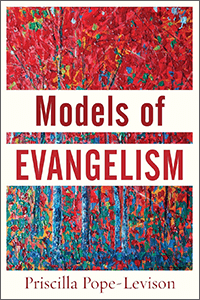Is your congregation squeamish when it comes to evangelism? Lewis Center Director F. Douglas Powe Jr. interviews Dr. Priscilla Pope-Levison, author of the new book Models of Evangelism, on how congregations can more authentically engage a variety of evangelistic practices with confidence and integrity.
Listen to this interview, watch the interview video, or continue reading.
Douglas Powe: Some people hear the word evangelism and think it’s just about getting people into the church. Why is it important to understand that there are various models of evangelism?
Priscilla Pope-Levison: I’ve been teaching evangelism for 25 years. I started integrating models into my course so that students had a practical way to anchor the actual practice of evangelism. It’s also an effort to dismantle fear, embarrassment, or just the confusion over the word evangelism. There’s not just one way to do most any kind of ministry. And this is true with evangelism, as well. So, if you had the impression that evangelism is being a revival preacher, you’re off the hook. Because that’s only one way to do evangelism.
By covering eight models of evangelism, I hope each person can see themselves implementing perhaps one of the models or maybe a combination of models that might fit their personality. If they tend to be an introvert or don’t want to do this alone, then they are small group evangelists. If they don’t feel comfortable talking directly to people, liturgical evangelism integrates evangelism into the very worship life of the church. So, by saying there’s not just one way to do evangelism, I’m trying to eliminate some of the barriers people feel.
Douglas Powe: Many people don’t like the word evangelism. But at its root evangelism means good news, good message. Why do folks shy away from something that literally means good news?
Priscilla Pope-Levison: I think part of it, particularly in the American context, is the number of prominent evangelists that have fallen, so to speak. Not just in the 80s and 90s, but think about Sinclair Lewis’s novel Elmer Gantry in the 20s and the Aimee Semple McPherson kidnapping saga. Often when you drill down into those fears, most individuals have not had a negative encounter with evangelism. But it’s kind of in the air because we don’t like sleazy preacher types or salespeople types.
At the end of the book, as I went back through each model and looked at the characteristics common to all the models, I came up with five: hospitality, integrity, relationship, message-bearing, and church-rootedness. I think the integrity piece is so important because many people, including our twentysomething kids, find Christians to be hypocritical because they say one thing and do another. I think we could go a long way to clear up the misconceptions over the word evangelism if we “walk the talk” and “talk the walk.” There needs to be integrity between the Gospel message we present and who we are as Gospel bearers. It sounds simplistic. But I really think that would go a long way to recapturing evangelism as something that is positive, winsome, and hospitable.
Douglas Powe: Some people go to the other extreme. They cite the quote attributed to Saint Francis (but that he really didn’t say), “Preach the gospel at all times and, when necessary, use words.” They think all they have to do is be a good person and somehow people will intuit that it’s because they are Christian. How do you avoid that extreme while still trying to help people understand the importance of integrity?
Priscilla Pope-Levison: Jonathan Merritt, in his recent book Learning to Speak God from Scratch, takes on that quote supposedly from Saint Francis. He says that quote misses the fact that Saint Francis preached verbally all the time. A number of years ago, a student in one of my classes asked if it was evangelism when she wore a T-shirt with her church’s name on it as she helped the victims of Hurricane Harvey. I really pushed back on that because I think that’s a cop-out. There is a time when a verbal presentation is part of it, even if that’s your own testimony of how God is active in your life. The Greek word euangelion is a message, a written message. In classical Greek, it was about a messenger coming into town with good news about an important battle or the birth of a ruler or something. And it has a verbal component to it. We may want to shy away from it, but I don’t think wearing a T-shirt with your church’s name is sufficient. It’s a start. It can be a conduit to a conversation, certainly. But it’s not enough on its own, especially now when we can no longer assume knowledge of Christianity. It reminds me of Paul, “How would they know unless there’s someone to tell them?” (Romans 10:14)
Douglas Powe: What is your practical advice on creating evangelistic small groups that are not just copies of existing church fellowship groups?
Priscilla Pope-Levison: I think there are a couple of reasons to start new small groups for evangelism. First, it’s a new port of entry, so everybody is on the same page. Secondly, the purpose of these small groups is evangelism. They’re not intended to be long term. They’re not intended to be a fellowship group that you stay with for the rest of your life. The whole point is that they’re intended to be four to eight weeks long and really targeted on helping people come to know Jesus. And for those who respond, the recent converts who are enthusiastic about their new faith, they are paired with an old timer, so to speak. And then they lead another new group together. So, the multiplication of these evangelistic small groups is built into the process. They are a different kind of beast from the ongoing fellowship groups or classes in churches or parachurch organizations. Although both have their value.
Douglas Powe: I laughed a little when I read the portion of your book where you recalled seeing individuals going door-to-door in your neighborhood, and you moving to another part of the house where they couldn’t see that you were home. The majority of people in the U.S. would probably react in that same manner. Yet you really believe in visitation evangelism.
Priscilla Pope-Levison: I try not to advocate for any particular model. Rather, I am reporting on them. And I didn’t feel I could publish a book on evangelism without including visitation. All the models of evangelism I lift up have biblical roots. And visitation has been around since the beginning of the Jewish-Christian tradition. Certainly we see it in John Wesley and early Methodism.
I was really influenced by a small book called The Oak Lane Story written by Dick Armstrong in the 60s or 70s when he was serving an inner-city church in Philadelphia. The church was dying as a result of changing racial and economic demographics. They could either turn inward and die or they could embrace their neighborhood. The church undertook a visitation campaign, and the changes that came to the church and the neighborhood are just fascinating. The church become a different kind of church in terms of their demographic and their giving. Seeing it through Dick Armstrong’s perspective was really eye-opening for me. It’s very different from James Kennedy’s Evangelism Explosion, for example, which is much more programmatic, and I think would turn people off.
The Greek word for visitation — I think it’s epískepsi — talks about God’s care for the sheep or God watching over. Visitation has this sense of care, of service, of coming alongside. I’m convinced inwardly focused churches would really benefit if they opened their eyes and got to know their neighborhood, even if it wasn’t a direct visitation program. So, I tried to give visitation a more positive spin, not because I’ve personally experienced a visitation campaign or led one, but because I want people to give it a second look and not just write it off.
Douglas Powe: So, what are ways to approach this practically without just immediately turning your neighbors off?
Priscilla Pope-Levison: Since my spouse, Jack, and I moved to Texas, we have gotten more politically involved. We did a lot of political campaigning several cycles ago to try to flip our district. And it worked. We made cold calls and all of that. We got some obnoxious and even some threatening responses, but we also had some really wonderful conversations. It just struck me that we will do that in a political season and be ready for the vitriol, yet as Christians we are hesitant to knock on doors for conversation.
Our own church is known for its music. During the pandemic, Jack had a terrific idea of having our choir just walk the streets of our neighborhood singing. Just saying “We’re in this neighborhood along with you, and we want to bring you some beautiful music.” They did this kind of thing in Italy. Is that evangelism? I don’t know. But If someone does open the door, I’d be really honest to say “We’re from such-and-such church. We really want to get to know our neighbors. That’s our agenda whether you ever come to our church or not.”
Douglas Powe: You use a term that may be unfamiliar to many, “liturgical evangelism.” Given the decline of mainline denominations, how effective do you think liturgical evangelism can be as we move forward?
Priscilla Pope-Levison: Liturgical evangelism integrates evangelism into worship. It’s a highly scripted model of evangelism. Many churches, including most United Methodist churches, have a certain rhythm or framework to their worship. And they could easily find ways to integrate some evangelistic moments into their worship rituals. What if we thought of each part of worship and asked, “How could it be an evangelist component?” The call to worship. Even the offertory. I think that would be a place to start.
Often, we think of highly liturgical churches as not being evangelistic. But this approach allows them to stay true to who they are and still be committed to evangelism. And it goes back to the roots of the early church and the apostolic tradition. Just as monastic communities marked the hours of the day, the church lives by a different sense of time. A church could start simply by bringing evangelism to the fore in different ways in different seasons of the liturgical year, integrating it into Advent, Lent, and so forth.
Yes, it does depend on people being in worship. But what I like about it is that it takes seriously the catechetical experience of worship — that we are teaching God’s salvation history. And people can hear the Gospel in ways that aren’t quite as “in your face” as visitation or one-on-one evangelism. They can almost “eavesdrop” on the Gospel message if you are attentive to presenting it a regular basis. It allows people to kind of grow into conversion rather than expecting that paradigmatic conversion moment. And I think this “slow burn” approach fits our contemporary context much more than the revival mentality.
Douglas Powe: You use a term that certainly fits our day, media evangelism. Can you share a little bit more about media evangelism?
Priscilla Pope-Levison: I struggled the most with this one because I am not really a social media person. I kind of dabble with Facebook every so often when I have a little bit of time. This is the model I learned the most about because I’m just not as involved in it. But again, I felt this chapter had to be in the book, not just because of contemporary social media, but because evangelism has to incorporate tools of communication. Communication is intrinsic to evangelism – radio and TV and now, of course, the internet and various social media. A church’s website is the window through which the world sees it, especially during COVID. So many churches orient their websites for their internal audience. No. You need to think of a website as how you interact with the world.
If nothing else, I hope after reading this chapter in my book churches will really update their websites and keep their websites conversing with people. They need to make sure their websites are user-friendly, “stranger friendly”, so to speak. That sounds kind of creepy, but you know what I’m saying. People are going online. They’re livestreaming. Jack and I have moved a number of times. And each time we came to a new city, we did a Google search of churches. Think about your website as inviting people in who don’t know you. Be sure service times are there and directions and all of that. But also, is there any testimony that you could provide of how God is active in your congregation? Is there something that brings the Gospel in your website?
Douglas Powe: After someone reads about the different models of evangelism in your book, what is your hope for how they would begin to integrate what they’ve learned? What are three initial steps?
Priscilla Pope-Levison: First, I would like as many people in the congregation as possible to become comfortable talking to others about how they see God in their own lives and their church’s life. This is very much on my mind right now because we have received a grant from the Lilly Endowment, Inc. called Testimony as Community Engagement. I think our story is written into God’s story. And our stories are a way to connect with people more easily than the Four Spiritual Laws or something that’s more content driven. Storytelling is alive and well right now. And a lot of that is because in COVID we missed each other, so we are longing to hear stories. We have to become much more comfortable telling the story of how God is active in our lives right now. We don’t even have to call it evangelism.
Secondly, I would hope that a church would do a deep dive into the models and ask which one or two best fits them now. Which could they honestly see themselves incorporating in the next year of their church’s life? Third, I would convene groups of people — not a committee but a group of people — to consider what some of these models could really mean not only for their church but for their community. I’m really convinced many churches have lost contact with their neighborhood and their location. And then really bath it all in prayer and listening and Scripture study. Because I believe that God responds to our pleadings and our prayers. It doesn’t matter whether a church has a big budget. That’s just not as important as having the capacity and the courage to be God’s instruments in the world in a much more radical way.
 5 Essential Qualities of Effective Evangelism by Priscilla Pope-Levison
5 Essential Qualities of Effective Evangelism by Priscilla Pope-Levison- Be the Welcoming Church Video Tool Kit
- 4 Characteristics of Biblical Evangelism by F. Douglas Powe Jr.
- Online Worship Makes Evangelism Less intimidating for Many by Doug Powe and Ann A. Michel






